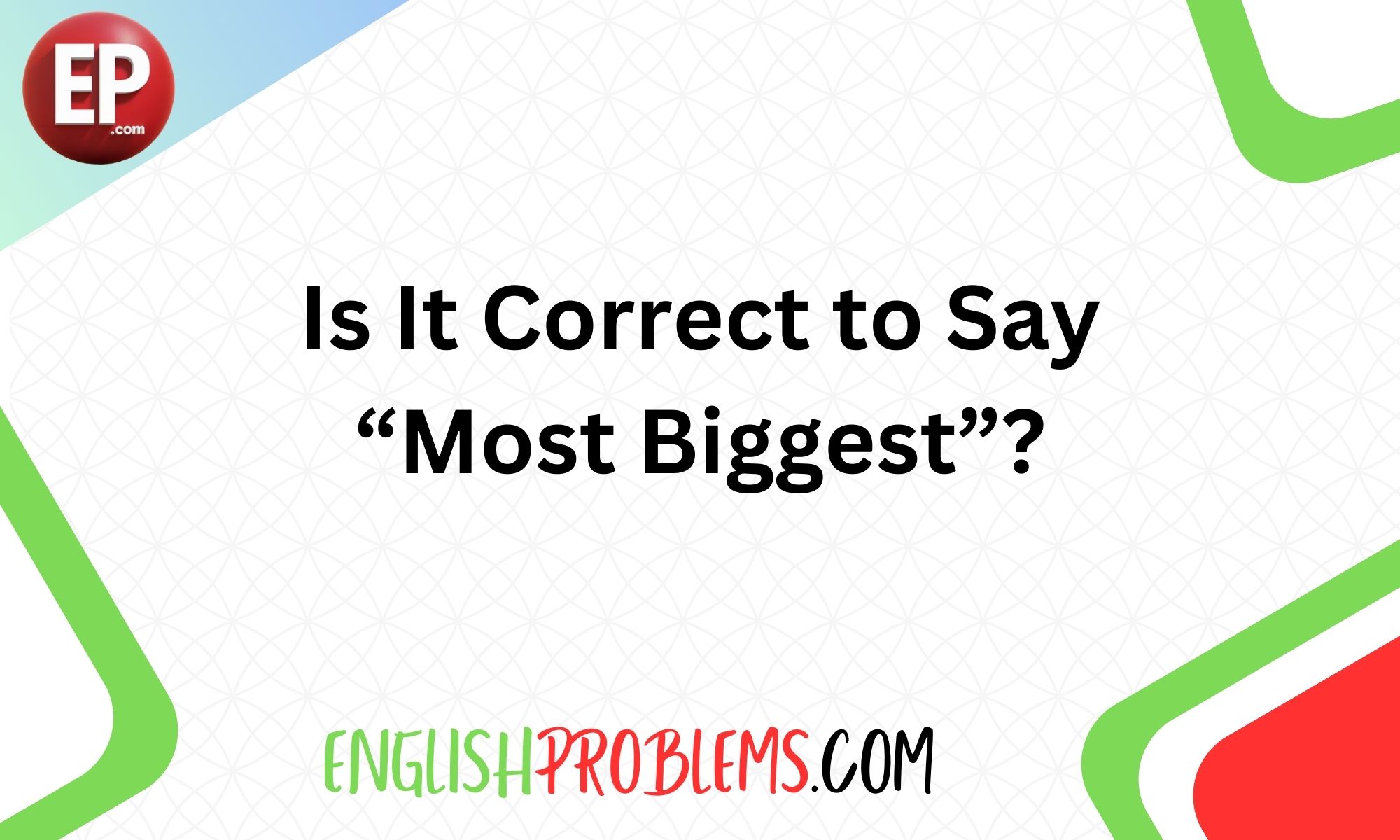In the world of grammar, few issues spark as much debate as the use of comparative and superlative forms. One common error that often arises is the phrase “most biggest.”
This blog post delves into why “most biggest” is incorrect and provides guidance on proper usage of comparatives and superlatives to help you express degrees of comparison accurately and effectively.
Understanding Comparatives and Superlatives
To address the issue of “most biggest,” it’s essential first to understand the rules of comparatives and superlatives. These are grammatical structures used to compare and describe different degrees of qualities.
Definition of Comparatives
Comparatives are used to compare two items or entities. They show how one is different or superior to the other. Generally, comparatives are formed by adding “-er” to one-syllable adjectives or by using “more” with adjectives of two or more syllables.
- One-syllable adjectives:
- Big becomes bigger
- Fast becomes faster
- Two-syllable adjectives ending in “-y”:
- Happy becomes happier
- Funny becomes funnier
- Two or more syllables:
- Beautiful becomes more beautiful
- Expensive becomes more expensive
Definition of Superlatives
Superlatives describe the extreme or highest degree of a quality among three or more items. They are formed by adding “-est” to one-syllable adjectives or by using “most” with adjectives of two or more syllables.
- One-syllable adjectives:
- Big becomes biggest
- Fast becomes fastest
- Two-syllable adjectives ending in “-y”:
- Happy becomes happiest
- Funny becomes funniest
- Two or more syllables:
- Beautiful becomes most beautiful
- Expensive becomes most expensive
Analyzing the Phrase “Most Biggest”
Now that we have a clear understanding of comparatives and superlatives, let’s analyze why “most biggest” is grammatically incorrect and explore common errors related to this misuse.
Grammatical Analysis
The phrase “most biggest” is a redundancy. In the English language, superlative forms already imply the highest degree of comparison. When we use “biggest,” it means it is the largest among a group of three or more things. Adding “most” is unnecessary and incorrect because it redundantly amplifies the superlative.
- Incorrect: This is the most biggest house on the block.
- Correct: This is the biggest house on the block.
In the sentence above, “biggest” already conveys the highest degree of size. Adding “most” only creates grammatical redundancy.
Common Errors in Superlatives
A common error related to “most biggest” is the misuse of “most” with adjectives that already have superlative forms. Here are some similar mistakes:
- Most unique: “Unique” is an absolute adjective and doesn’t have a comparative form.
- Most perfect: Similarly, “perfect” is absolute and doesn’t require “most” to express the extreme degree.
Correct Usage of “Biggest”
Using “biggest” correctly involves understanding when it is appropriate to use the superlative form without additional qualifiers.
When to Use “Biggest”
“Biggest” is the superlative form of “big” and should be used when comparing three or more entities. Here’s how it fits correctly in sentences:
- Example 1: Out of all the skyscrapers in the city, the Burj Khalifa is the biggest.
- Example 2: The blue whale is the biggest animal in the ocean.
In these sentences, “biggest” is used to indicate the highest degree of size among a group.
Why “Biggest” Is Sufficient
The superlative “biggest” already implies the highest degree of the quality being described. There’s no need to use “most” because “biggest” alone conveys that something is larger than all others being considered.
Alternatives and Solutions
When you want to emphasize a superlative or add clarity, you can use alternative phrases instead of “most biggest.” These alternatives avoid redundancy while maintaining emphasis.
How to Correctly Express Emphasis
Instead of saying “most biggest,” consider these alternatives:
- By far the biggest: This phrase adds emphasis without redundancy.
- Example: The Grand Canyon is by far the biggest canyon in the world.
- Absolutely the biggest: This conveys a strong emphasis.
- Example: This is absolutely the biggest fish I’ve ever caught.
Practical Tips
To avoid making similar mistakes:
- Proofreading Strategies:
- Always check if your comparative or superlative is used correctly.
- Ensure that “most” is only used with adjectives that require it, not with those that already have a superlative form.
- Tools and Resources:
- Use grammar-checking tools like Grammarly or Hemingway to catch errors.
- Refer to style guides or grammar resources for guidance on proper usage.
Summary and Key Takeaways
In summary, “most biggest” is an incorrect and redundant phrase. Understanding the rules for comparatives and superlatives helps in using them accurately. Here are the key points to remember:
- Use “biggest” for the highest degree of size among three or more things.
- Avoid redundancy by not combining “most” with superlative forms like “biggest.”
- Use alternatives like “by far the biggest” to emphasize without redundancy.
Conclusion
Correct usage of comparatives and superlatives ensures clear and effective communication. By avoiding errors like “most biggest,” you can enhance your writing and speech. If you have any questions or thoughts on this topic, feel free to share them. Practice using comparatives and superlatives correctly to master these important aspects of grammar.
This comprehensive guide provides clear explanations and practical advice to help you use comparatives and superlatives correctly. It also addresses common errors and offers alternatives to ensure effective communication.

Nicholas Clark is a master wordsmith with a passion for unraveling the complexities of the English language. With a keen eye for detail and a love for grammar, he transforms tricky language issues into engaging and understandable lessons. Nicholas’s insightful articles make mastering English a delightful journey.










